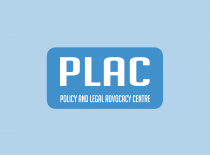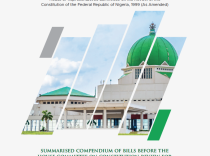The House of Representatives during its plenary session of Tuesday 13 October 2020 presented the N13.08 trillion 2021 Appropriation Bill for second reading. The Appropriation Bill was extensively debated across two days- Tuesday, 13 October 2020 and Wednesday, 14 October 2020.
In leading the debate, the Majority Leader, Hon. Ado Doguwa (Kano:APC) stated that the budget estimate was presented by the President on Thursday, 8 October 2020 at a joint session of the National Assembly. Commending the budget estimates, he stated that conservative parameters were used and that the budget was in the overall interest of the country as it focused on general rehabilitation, improving education, health and agriculture sectors and providing security. He concluded by noting that the budget should be accepted in good faith.
A significant number of legislators contributed to the debate and raised some pertinent issues on the bill. Some of the key comments include:
- Borrowing and Fiscal Responsibility Act: Hon. Ossai Nicholas Ossai (Delta:PDP) stated that the budget deficit is almost 50% of the proposed budget, which will be funded by borrowing. Hon. Sada Soli (Katsina:APC) indicated that there is cause to worry about the budget deficit as projects that are being funded through borrowing may not have commenced during the budget cycle because of the cumbersome procurement process of MDAs. It was also highlighted that the planned borrowing exceeds the limit of 3% GDP imposed by section 12(1) of the Fiscal Responsibility Act 2007. Although, it can be said that National Assembly has the power to revise this as the provision adds “or any sustainable percentage as may be determined by the National Assembly for each financial year”.
- Recurrent to Capital Ratio/ Increase in Capital Allocation: Hon. Yunusa Ahmad Abubakar (Gombe:APC) argued that there is a need to close the gap between recurrent and capital allocations. Hon. Thomas Ereyitomi (Delta:PDP) noted that recurrent allocation takes a large chunk of the budget, at present, efforts need to be made to increase capital allocation. This was buttressed by the presentation by Hon. Benjamin Okezie Kalu (Abia:APC) who noted that 43.19% of the budget estimate is for recurrent, 27.55% for capital, 25.6% debt service and 3.07% statutory transfers.
- Reduction in the cost of governance: Tied to the issue of high recurrent budget is the argument in favour of a reduction in the cost of governance. This point was raised by Hon. Abdulrazak Namdas (Adamawa:PDP) who stated that cost of governance ought to be reduced in order to raise more funds for capital allocation. Others who commented on this questioned the allocation for newly created MDAs where efforts ought to be made to curb the increase in MDAs as a means of reducing cost.
- Increase in allocation for Education, Health, Agriculture and Infrastructure sectors: Hon. Robert Tyough (Benue:PDP) stated that although there has been an increase in the allocations to the education and health sectors, there is a focus in the budget on areas that are not as pressing. For instance, N446 billion has been proposed for disaster management, whereas only N127 billion was proposed for education, while N132 billion was proposed for health. He noted that it appears more allocation is being provided for future unforeseen disaster as opposed to the waiting disaster of education. Specifically on Agriculture, Hon. Tahir Monguno (Borno:APC) indicated that the budget estimate is not up to 1%, which is poor considering that the sector accounts for 70% of employment and 30% of GDP.
- Revenue Generation: It was argued by Hon. Stanley Adedeji (Oyo:PDP) that the use of technology can be used to boost revenue generation. He gave as an example the use of data analytics by FIRS to generate more revenue. Hon. Leke Abejide (Kogi:PDP) noted that if key infrastructural issues can be addressed, revenue generation efforts would be enhanced. For example, improving the ports to allow customs process more imported goods, and investing in roads and rail as they are of economic value and could bring in more revenue for the government.
- Addressing Unemployment and Job Creation: Hon. Ali Wudil (Kano:APC) pointed out that the issue of unemployment needs to be critically treated in the budget. He added that over 20 million Nigerian youths are unemployed and the Nigeria Directorate of Employment needs to be further empowered. Hon. Bamidele Salam (Osun:PDP) noted that efforts should be channeled to job creation as unemployment poses a challenge and threat to security and democracy. Similar views were also echoed by Hon. Julius Ihonvbere (Edo:APC). Although it was highlighted that N25 billion was set aside under the National Youth Investment Fund, there was consensus that more is required.
A key point raised was on the key assumptions. Hon. Abubakar Salame (Sokoto:APC) pointed out that the parameters should not only be based on oil as it shows there is no direction towards diversification in the budget. He noted that in the consideration of the 2021 budget proposal, legislative assumptions and benchmarks for items that can promote economic diversification such as putting a monetary parameter to gold, tin, cocoa or rice should be included. He stated that the essence of this would be to increase the scope of the assumptions and reflect the inclusive demands of the people.
On sums to be deducted from the Consolidated Revenue Fund (CRF), it was noted that some deductions have not met their statutory benchmarks such as the allocation for Basic Health Provision Fund which is short of the 1% CRF allocation. This issue was also highlighted with the NDDC, where Hon. Olubunmi Ojo (Ondo:APC) stated that the amount allocated was short of the statutory amount that ought to be set aside for it from the Fund. Hon. Ojo added that the government is owing NDDC the sum of N1.6trillion stemming from underremittances.
Other notable suggestions/observations were:
- Inclusion of a column for capital allocation released so far for ongoing capital projects.
- Utilisation of bottom-up budgeting requiring MDAs to consult with legislators on needed projects in their constituencies.
- Unification of exchange rate as the current practice is distorting the economy and creating unnecessary inflation.
- The revenue generation from the increase in VAT and other revenue drive schemes should be reflected in the budget.
- Increase in allocation for the Judiciary in view of the new judges coming on board and the likely expansion of the number of Court of Appeal judges (in the event that a Constitution Alteration bill proposing this scales through).
Following this debate, the 2021 Appropriation Bill passed second reading and was referred to the Committee on Appropriation.





